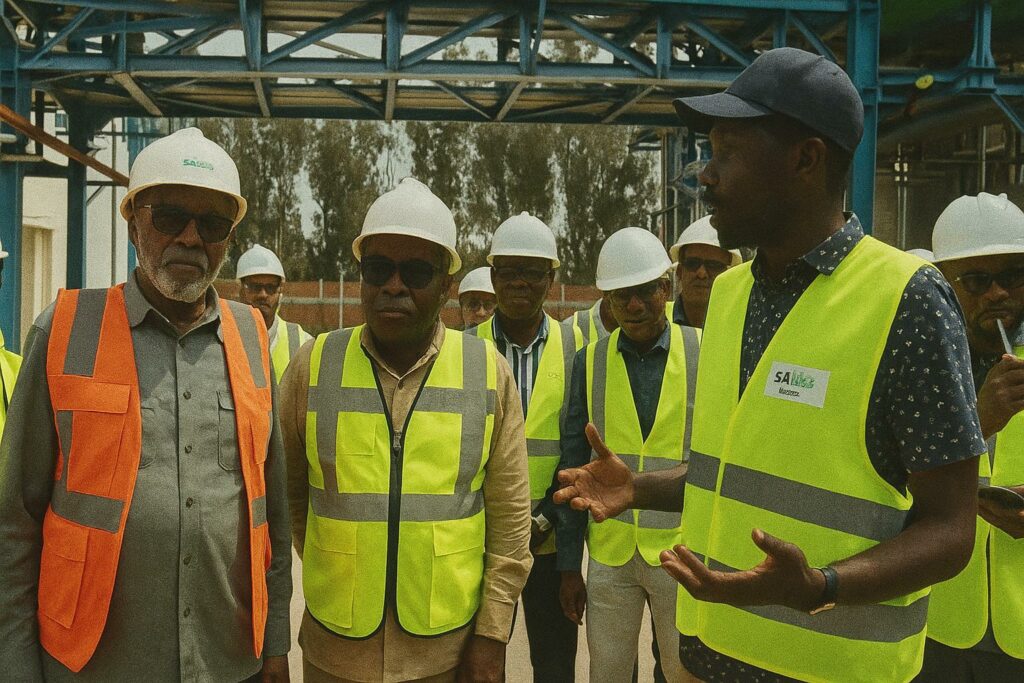A ribbon-cutting that echoes far beyond Nkayi
When the red ribbon is finally severed in Nkayi on 27 June, the gesture will resonate well beyond the vast cane fields of the Bouenza valley. Somdia, the agro-industrial arm of France’s Castel Group, is inaugurating the Republic of Congo’s very first ethanol distillery: a €23 million facility capable of producing 6 million litres per year, nominally outstripping the nation’s current demand. To local officials the plant represents a tangible break with chronic dependency on imported alcohol; to regional observers it illustrates a wider contest for industrial self-reliance in Central Africa.
Vertical integration as geopolitical calculus
Castel’s decision to internalise the alcohol segment follows a global trend among beverage conglomerates seeking refuge from volatile supply chains exposed by the pandemic and the war in Ukraine. By transforming 25 000 tonnes of molasses—until now an undervalued by-product of Saris Congo’s sugar operations—Somdia can guarantee steady feedstock at predictable cost while shielding its breweries from exchange-rate swings. The strategic logic mirrors Abuja’s push for petrochemical localisation and Nairobi’s pharmaceutical industrial parks: tighten domestic value chains, pocket foreign-exchange savings and accumulate political capital for governments eager to show ‘made-here’ credentials (African Development Bank 2024).
Bioethanol and Africa’s energy narrative
The Nkayi plant enters service at a moment when biofuels are regaining diplomatic currency. At COP28, several African states framed sugarcane ethanol as a bridge between economic diversification and decarbonisation (International Energy Agency 2023). Although Somdia’s output is earmarked for beverage and pharmaceutical uses rather than transport fuel, Brazzaville is already hinting that surplus capacity could underpin a future E10 blending mandate. Such signals dovetail with the African Union’s Green Recovery Action Plan, which positions bioenergy as an indigenous resource capable of diluting the continent’s crude-oil import bill.
Labour, land and local expectations
Somdia advertises more than 200 direct jobs tied to the distillery and 4 000 workers retained on Saris plantations. Yet trade-union leaders in Bouenza insist that decent wages and vocational training will determine whether the project becomes a textbook case of inclusive growth or merely an enclave economy. Meanwhile, customary landholders worry that expanding cane beyond the current 12 000 hectares might magnify tensions over tenure, a recurrent fault line in Congo-Brazzaville’s rural politics (Congo Research Group 2023). Government interlocutors respond that the existing 20 000-hectare concession provides ample headroom, but civil-society monitors demand legally binding social impact audits rather than corporate assurances.
Environmental diligence amid climate pledges
Molasses-based ethanol typically enjoys a favourable carbon balance, emitting roughly one-third of the greenhouse gases generated by fossil-derived industrial alcohol (UNIDO 2022). Still, life-cycle gains hinge on efficient boiler technology, wastewater management and bagasse cogeneration—areas in which Praj, the Indian engineering contractor, claims competitive expertise. If fully implemented, the closed-loop design could align with Congo’s nationally determined contribution under the Paris Agreement, which pledges a 17 percent emissions cut by 2030. Yet environmental NGOs point to episodes in Mozambique and Malawi where lax oversight turned distilleries into high-COD effluent sources. Nkayi will thus test Brazzaville’s regulatory apparatus as much as Praj’s blueprints.
Foreign partners, financial architecture and risk
The project’s financing combines Castel equity, a syndicated loan underwritten by regional banks and equipment guarantees from France’s Bpifrance Assurance Export, a structure reflecting both private appetite and sovereign backing. While credit-rating agencies applaud the revenue visibility of an offtake agreement with Castel breweries, they flag two vulnerabilities: currency convertibility in a CFA-franc zone under fiscal strain and potential tax revisions should Congo seek greater rent capture. Investors recall the 2020 revision of the Mining Code in neighbouring DRC as a cautionary tale, yet Congo’s finance ministry maintains that ethanol qualifies as a ‘priority diversification sector’ eligible for tax stability clauses.
Between promise and policy reality
In the short term, Nkayi’s distillery will likely fulfil its narrow mandate: substitute roughly €8 million worth of annual ethanol imports, extend the cane value chain and score reputational points for both Castel and the Congolese presidency ahead of 2026 elections. The medium-term picture is less deterministic. Turning an industrial demonstration into a scalable biofuel programme demands logistics corridors, fuel-quality regulations and credible carbon-credit registries—public-goods the Congolese state has struggled to provide. As one Brazzaville-based diplomat quipped, ‘The distillery is the easy part; the institutions that keep it competitive are the real work.’
A modest plant with outsized symbolism
Measured against global bioethanol behemoths in Brazil or the United States, Somdia’s 50-cubic-metre-per-day unit is almost diminutive. Yet symbolism in international political economy is rarely calibrated by volume. By anchoring private capital to local raw material and by gesturing toward climate compatibility, the Nkayi facility encapsulates a narrative that African leaders have championed since the Lagos Plan of Action: process at home, export the surplus and retain value onshore. Whether the narrative morphs into durable reality will depend on policy stamina, environmental vigilance and the elasticity of international markets increasingly attuned to green credentials.

